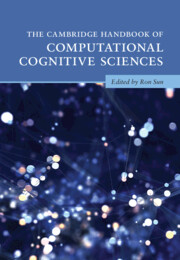Book contents
- The Cambridge Handbook of Computational Cognitive Sciences
- Cambridge Handbooks in Psychology
- The Cambridge Handbook of Computational Cognitive Sciences
- Copyright page
- Contents
- Preface
- Contributors
- Part I Introduction
- Part II Cognitive Modeling Paradigms
- Part III Computational Modeling of Basic Cognitive Functionalities
- Part IV Computational Modeling in Various Cognitive Fields
- 23 Computational Models of Developmental Psychology
- 24 Computational Models in Personality and Social Psychology
- 25 Computational Modeling in Industrial-Organizational Psychology
- 26 Computational Modeling in Psychiatry
- 27 Computational Psycholinguistics
- 28 Natural Language Understanding and Generation
- 29 Computational Models of Creativity
- 30 Computational Models of Emotion and Cognition-Emotion Interaction
- 31 Computational Approaches to Morality
- 32 Cognitive Modeling in Social Simulation
- 33 Cognitive Modeling for Cognitive Engineering
- 34 Modeling Vision
- 35 Models of Multi-Level Motor Control
- Part V General Discussion
- Index
- References
30 - Computational Models of Emotion and Cognition-Emotion Interaction
from Part IV - Computational Modeling in Various Cognitive Fields
Published online by Cambridge University Press: 21 April 2023
- The Cambridge Handbook of Computational Cognitive Sciences
- Cambridge Handbooks in Psychology
- The Cambridge Handbook of Computational Cognitive Sciences
- Copyright page
- Contents
- Preface
- Contributors
- Part I Introduction
- Part II Cognitive Modeling Paradigms
- Part III Computational Modeling of Basic Cognitive Functionalities
- Part IV Computational Modeling in Various Cognitive Fields
- 23 Computational Models of Developmental Psychology
- 24 Computational Models in Personality and Social Psychology
- 25 Computational Modeling in Industrial-Organizational Psychology
- 26 Computational Modeling in Psychiatry
- 27 Computational Psycholinguistics
- 28 Natural Language Understanding and Generation
- 29 Computational Models of Creativity
- 30 Computational Models of Emotion and Cognition-Emotion Interaction
- 31 Computational Approaches to Morality
- 32 Cognitive Modeling in Social Simulation
- 33 Cognitive Modeling for Cognitive Engineering
- 34 Modeling Vision
- 35 Models of Multi-Level Motor Control
- Part V General Discussion
- Index
- References
Summary
Recent decades have witnessed a rapid growth in computational emotion modeling. Models are being developed to enhance believability and autonomy of virtual agents and robots, and for basic research purposes, to help elucidate mechanisms mediating affective processes in biological agents.This chapter provides a comprehensive introduction and state-of-the-art overview of this emerging subdiscipline within the broader area of affective computing, focusing on models at the psychological (vs. neuroscience) level, and those that emphasize cognition emotion interactions.Following an overview of emotion research from psychology, the theoretical foundations for model design are discussed. An analytical framework is then introduced, to promote a more abstract perspective on model design and analysis, followed by a discussion of specific approaches to modeling emotion generation and emotion effects, along with examples of representative models.The chapter concludes with a discussion of model validation and evaluation, and highlights some of the open questions and key challenges.
Keywords
- Type
- Chapter
- Information
- The Cambridge Handbook of Computational Cognitive Sciences , pp. 973 - 1036Publisher: Cambridge University PressPrint publication year: 2023

